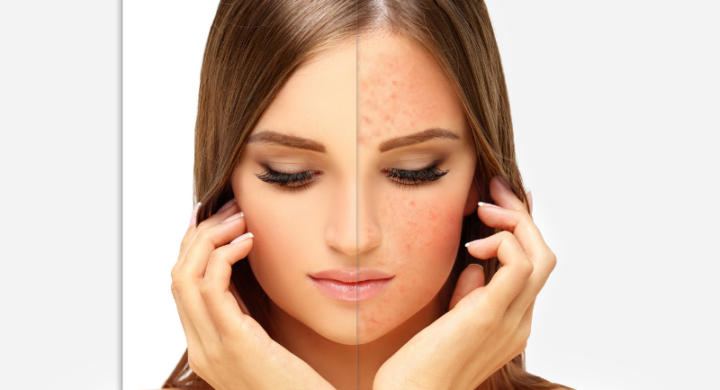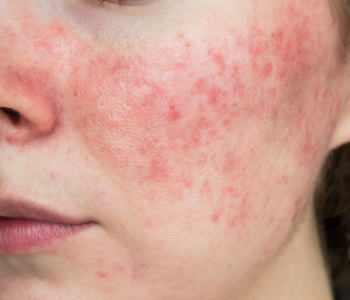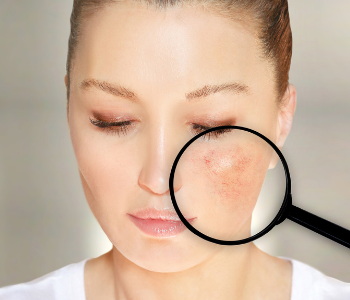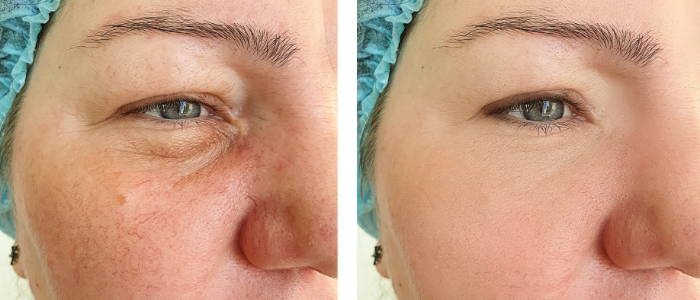6 Questions About Rosacea That You’re Too Embarrassed To Ask!
Rosacea is a prevalent skin condition that affects over 415 million people worldwide! Unfortunately, this facial skin disorder has no cure, but treatments are available to help manage it! While it is not life-threatening, it can be very uncomfortable to endure and can have painful consequences if left untreated.
Despite it being quite common, there’s a lot of mystery and shame surrounding this condition. So here are six common questions you may have about rosacea.
1. What is rosacea, and what are the symptoms?
Rosacea is a chronic but treatable skin disorder that primarily affects the center of the face, cheeks, and nose. It can often be misdiagnosed and mistaken for acne, eczema, allergic reaction, or a natural ruddiness. While it is not life-threatening, it can be very uncomfortable to endure. Rosacea is a condition that develops over time. It may
start as a slight flush to the cheeks and gradually spread. The severest symptoms of rosacea don’t typically tend to show until after the age of 30. The most common symptoms of rosacea include but are not limited to:
- Persistent redness, facial blushing, and facial blushing
- Small, pus-filled bumps
- Visible blood vessels on the cheeks, nasal bridge, and other areas of the face
- Burning or stinging sensation
- Skin thickening, particularly on the nose
- Facial swelling
- Excessive facial dryness
- Enlarged pores
- Dry, irritated, and swollen eyes and eyelids.
2. What causes rosacea, and is it hereditary or something else entirely?
The most recent studies have shown that rosacea may be linked to the start of an inflammation caused by neurovascular dysregulation and an innate immune system. However, the direct cause of the disease is still unknown. Anyone can develop rosacea.
However, your chances of developing this skin condition are higher if you have fair skin that burns quickly in the sun, smoke, are over the age of 30, or have a family history of rosacea. While rosacea is more common in women, men tend to have more severe symptoms.
3. How is rosacea treated, and are there any natural remedies that help?
The symptoms of rosacea can vary vastly from patient to patient. Therefore, it is best to see a doctor or dermatologist that can analyze your skin and make recommendations based on your specific needs.
However, the best way to treat rosacea is by using a three-pronged approach.
Treatments
There are several different treatments available that can help treat and manage rosacea symptoms. There’s a range of oral and topical solutions that can help reduce the inflammation of the skin and help reduce the frequency of flare ups.
If you prefer more natural remedies, you can incorporate the use of natural anti-inflammatories such as lavender, licorice, chamomile, and oatmeal into your daily routine.
Laser treatments such as IPL or VBeam, can remove visible blood vessels and correct the thickening of the skin.
If you’re experiencing an issue with ocular rosacea, an eye doctor will be able to prescribe medication to calm watery, itchy eyes.
Skincare
Your skincare regimen is essential when it comes to managing rosacea. We advise consulting a dermatologist or esthetician who can make recommendations tailored to your skin’s unique needs. Use a mild cleanser to cleanse the skin without stripping away too much moisture. Keep the skin hydrated and nourished with gentle, non-irritating moisturizers and serums.
Always follow up with sunscreen to block out harmful UVA/UVB rays! If your skin is sensitive, we suggest using a mineral-based sunscreen instead of a chemical one.
Don’t pull, tug, or scrub your skin! The skin is compromised, and too much friction may cause additional inflammation.
Lifestyle management
You can improve your chances of reducing rosacea flare-ups by controlling lifestyle and environmental factors.
Heat, stress, alcohol are the most common rosacea triggers. However, these triggers can vary significantly from one patient to another.
Keep a diary to help you identify patterns and what may cause your rosacea flare-up. Commonly overlooked triggers can be allergies to certain foods, extreme temperatures, and even skincare products.
While rosacea can go into remission, it will never truly go away. However, you can bring your rosacea under control through consistency and diligence.
4. Is rosacea contagious?
No. Rosacea is not contagious. It cannot be contracted from or given to others.
In some cases, rosacea can spread from the face and appear on the chest, neck, ears, and scalp. However, this is not due to the disorder being contagious. If the condition is left untreated, the inflammation can spread throughout the body.
5. Are there any long-term effects of untreated rosacea?
If you suspect that you have rosacea, it is crucial to see a dermatologist or expert that can diagnose and treat it. This is not simply a cosmetic or aesthetic condition. If left untreated, rosacea can have permanent and painful consequences.
If inflammation in the skin is not relieved, it can result in the appearance of red, pus-filled bumps. If ruptured, these bumps can be quite painful and leave post-inflammatory scarring.
Over time, the condition can also thicken the skin. This occurs most commonly on the nose and can cause the nose to take on a swollen bulbous appearance. If left untreated, rosacea can irritate the eyelids putting excessive pressure on the eyes, leaving them bloodshot and watery. In the most severe cases, rosacea can lead to permanent vision loss! If you’re experiencing vision problems, seek medical attention immediately!
6. I’ve been diagnosed with rosacea – now what do I do?!
Unfortunately, there is no cure for rosacea. While researchers are making great strides in their research about the condition and its causes, it may be a while longer before we see a cure.
However, there’s no need to despair or be fearful! It is not life-threatening. Rosacea is one of the most common skin disorders and affects millions worldwide. You can manage it. If you diligently monitor your triggers and treat your skin properly, you will significantly reduce the frequency of rosacea flare-ups.
References:
https://www.mayoclinic.org/diseases-conditions/rosacea/diagnosis-treatment/dr…
https://modernbodyclinic.com/a-complete-guide-to-rosacea/
https://www.aad.org/public/diseases/rosacea/treatment/necessary




